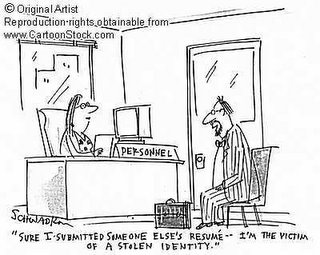1/26/2006
The importance of identity
 How would Levinas have thought about the importance of identity? Many critics say that he doesn't recognize the importance of identity at all. Indeed if you would count the word identity in his texts you won't find it very often. For Levinas the main point is that the other should be welcomed unconditionally, no matter who is. We all have different characteristics, we belong to different groups and categories, but we are always equal as humans. For the universal principle of how I should treat the other, for the question whether I take my responsibility for the other or whether I totalize him, it doesn't matter who the other person is. But this doesn't mean that it wouldn't matter at all in general.
How would Levinas have thought about the importance of identity? Many critics say that he doesn't recognize the importance of identity at all. Indeed if you would count the word identity in his texts you won't find it very often. For Levinas the main point is that the other should be welcomed unconditionally, no matter who is. We all have different characteristics, we belong to different groups and categories, but we are always equal as humans. For the universal principle of how I should treat the other, for the question whether I take my responsibility for the other or whether I totalize him, it doesn't matter who the other person is. But this doesn't mean that it wouldn't matter at all in general.Rudi Visker says in "Going strange and remaining strange" (see also Strangers and strange books):
"When we follow Levinas' thinking, we will start to consider racism as the prototype of ethical evil, because the racist is exactly the one who tries to reduce the other to its "form", who doesn't look at his real face but who finally treats him as an interchangeable and replacable copy of his species, somebody who shows characteristics of a certain race which are different from my race and inferior to mine. It is in order to stop this reduction that the other should be welcomed without any "cultural decorations", without the reduction which takes away his dignity as an equal human being and also as a unique irreplacable individual. But what if the other person doesn't want to be recognized as an "abstract human"? What if he doesn't want to be just some "other person", but a woman, black, or gay? When somebody likes to call himself a "black American" it doesn't mean he reduces himself to a certain species, but it doesn't mean he wants or is able to disassociate himself from that either."I find it strange that when the other isn't being reduced to the categories he belongs to, that he would immediately become "abstract". The fact that the other deserves to be treated as an equal human, always, no matter who he is, only says something about how he should be treated as a human, not about whether it matters or not who he actually is.
I just started to read Levinas' Talmudic studies. There he speaks more about identity than in his philosophical books. The reason why is clear: when he studies Jewish religious texts he automatically starts to reflect as well on what it means to be Jewish, how a Jewish identity can be characterized. He doesn't think that these traditions which have been taught to children from generation to generation, would be irrelevant to describe a person. A personal background / identity can't be put away at once and why should we try at all to distanciate us from that?
Levinas describes in "L'au-dela du verset" how every individual reads the holy Jewish texts in a different way, and also in different times it will be read in a different way. He who reads it is being challenged, not only to understand it's universal meaning, but also to understand the part which is inimitable for others, which is related to the unicity of that person and his personal abilities. Still this doesn't point to a lack of objectivity in the texts. The truth of revelation is a process of the creation of a meaning from the moment the I forms a irreplacable identity. This means that the wealth and thruth of these texts can only be shown in the multiplicity of people and generations, not just by one person.
An individual cannot be reduced to a race or category of "black Americans". But on the other hand this doesn't mean that it wouldn't matter for a person to be a "black American". That might be one of the characteristics that he uses to describe himself. This doesn't mean he becomes interchangeable with any other black American, he is still a unique individual with a combination of characteristics that nobody else has.
"My ownness is not - contrary to what Levinas thinks - something I can give up. Take for instance gender. To be a man or a woman is a characteristic to which people don't want to be reduced. To call a woman a "chick" means to treat her as a copy of a certain species, and to take away her uniqueness. That is sexism. But at the same time she won't like her being a woman to be ignored either. She wants to be recognized both as a human and a woman."
 I totally agree with Rudi Visker, with the example that a woman wants to be recognized not only as human but also as a woman, which doesn't mean she likes sexism. However, in my opinion Visker is mistaken to think that Levinas claims that people can easily give up their identity. With regard to Judaism it's the most clear that Levinas doesn't expect people to leave their identity behind. It's interesting what Levinas writes about the Jewish identity in his Talmudic studies. He speaks about assimilation, and that it's a bad thing when the diaspora completely adopts the western culture and when the Jewish traditions only become folklore. But on the other hand he also says that to be stuck with a Jewish culture which is not open for dialogue and the polemic of the West, predetermines the for the ghetto and for fysical extermination.
I totally agree with Rudi Visker, with the example that a woman wants to be recognized not only as human but also as a woman, which doesn't mean she likes sexism. However, in my opinion Visker is mistaken to think that Levinas claims that people can easily give up their identity. With regard to Judaism it's the most clear that Levinas doesn't expect people to leave their identity behind. It's interesting what Levinas writes about the Jewish identity in his Talmudic studies. He speaks about assimilation, and that it's a bad thing when the diaspora completely adopts the western culture and when the Jewish traditions only become folklore. But on the other hand he also says that to be stuck with a Jewish culture which is not open for dialogue and the polemic of the West, predetermines the for the ghetto and for fysical extermination. He searches for a way to breathe new life into the old Jewish texts by rereading them with modern eyes and by translating them to the language of Greek Western philosophy. The Jews shouldn't lock themselves up in their own Jewish corner and they should completely assimilate to the Western culture either. They should find a new way and new language to express their identity and to start a dialogue with people with other backgrounds.
It's very well possible to value, keep and express your own identity and at the same time to meet the totally other with an open mind. It's very well possible to recognize / consider a Jew as a Jew, even though he is in the first place a human being (like with the example of the woman). It's very well possible to be universally human, particularistically Jewish and individually a unique personality, all of that at the same time.
I don't know how this song sounds but I like the lyrics from Gloria Gaynor:

I am what I am
I am my own special creation
So come take a look
Give me the hook
Or the ovation
It's my world
That I want to have a little pride
My world
And it's not a place
I have to hide in
Life's not worth a dam
Till I can say I am what I am
I am what I am
I don't want praise
I don't want pity
I bang my own drum
Some think it's noise
I think it's pretty
And so what if I love each sparkle and each bangle
Why not see things from a different angle
Your life is a shame
Till you can shout out I am what I am
I am what I am
And what I am needs no excuses
I deal my own deck
Sometimes the aces sometimes the deuces
It's one life and there's no return and no deposit
One life so it's time to open up your closet
Life's not worth a dam
Till you can shout out I am what I am
I am good
I am strong
I am worthy
I belong
I am useful
I am true
I am somebody
Yes I am
Comments:
<< Home
identity is an aspect that can unite as well as divide us. in diverse culture we look at cultural richeness while one group in the community may look at it self as a superior to another,as was seen in the wars of the world one and two.other will use difference in identity to devalue another race as can be seen in the syphilis experiment in united state by a pychologist.
thank you
thank you
So let us be united instead of divided, right?
We are different but equal. We don't have to give up our identities but we can never use them to claim superiority.
Post a Comment
We are different but equal. We don't have to give up our identities but we can never use them to claim superiority.
<< Home

